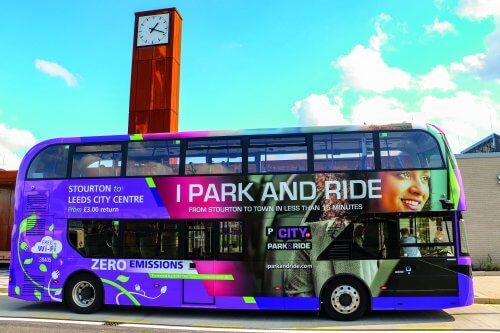Stourton park & ride’s fully electric buses have already saved over 100 tonnes of carbon emissions since the site on the outskirts Leeds launched in September 2021, which is said to be the equivalent to taking 4.4 cars off the road for every return bus journey. Based on the total number of journeys made by the fleet every day, the site could be removing more than 2,200 cars a week from the route into Leeds.
Tracy Brabin, Mayor of West Yorkshire, said: “I’m delighted to see so many people take advantage of Stourton park & ride. By parking the car and taking one of our fast, all-electric buses into Leeds city centre they’re helping to reduce CO2 emissions along a major road, as well as helping to reduce congestion and improve air quality at busy times.
“Together with other park & ride sites at Elland Road and Temple Green it’s a step towards delivering my pledge to tackle the climate emergency, as well as the wider aim of transforming West Yorkshire into a net zero carbon economy by 2038.”
Stourton is also geared up to convince car drivers to help make the CO2 savings even greater. The site became the UK’s first solar powered park & ride when it opened on 6 September last year, and figures to the end of the year show it had attracted over 13,800 motorists to make 29,775 trips into and out of Leeds instead of driving.
Paul Matthews, Managing Director of First West Yorkshire, said: “These figures show the real impact our fleet has in removing carbon emissions and what can be achieved in future.
“We can be sure that carbon emissions are reduced on this route all the time by our fully-electric buses and as cars are parked up at the site, so no longer make a journey into the city. We are determined to build on our success in growing sustainable travel and creating cleaner air in Leeds. This will also help to reduce congestion and continue to support the revival of the local economy as more people return to public transport for work and leisure.”
The £38.5 million public transport project in Stourton, on the southern approach to the city, aims to drastically lower commuting costs, improve air quality and heavily reduce carbon emissions. Solar panels and a battery storage system provide energy for the entire site. The buses operate every 10 minutes along dedicated bus lanes, with a journey time of 10-15 minutes.
Solar energy also powers 26 electric vehicle charging points, whilst the site provides secure cycle storage and 1,200 vehicle spaces.


